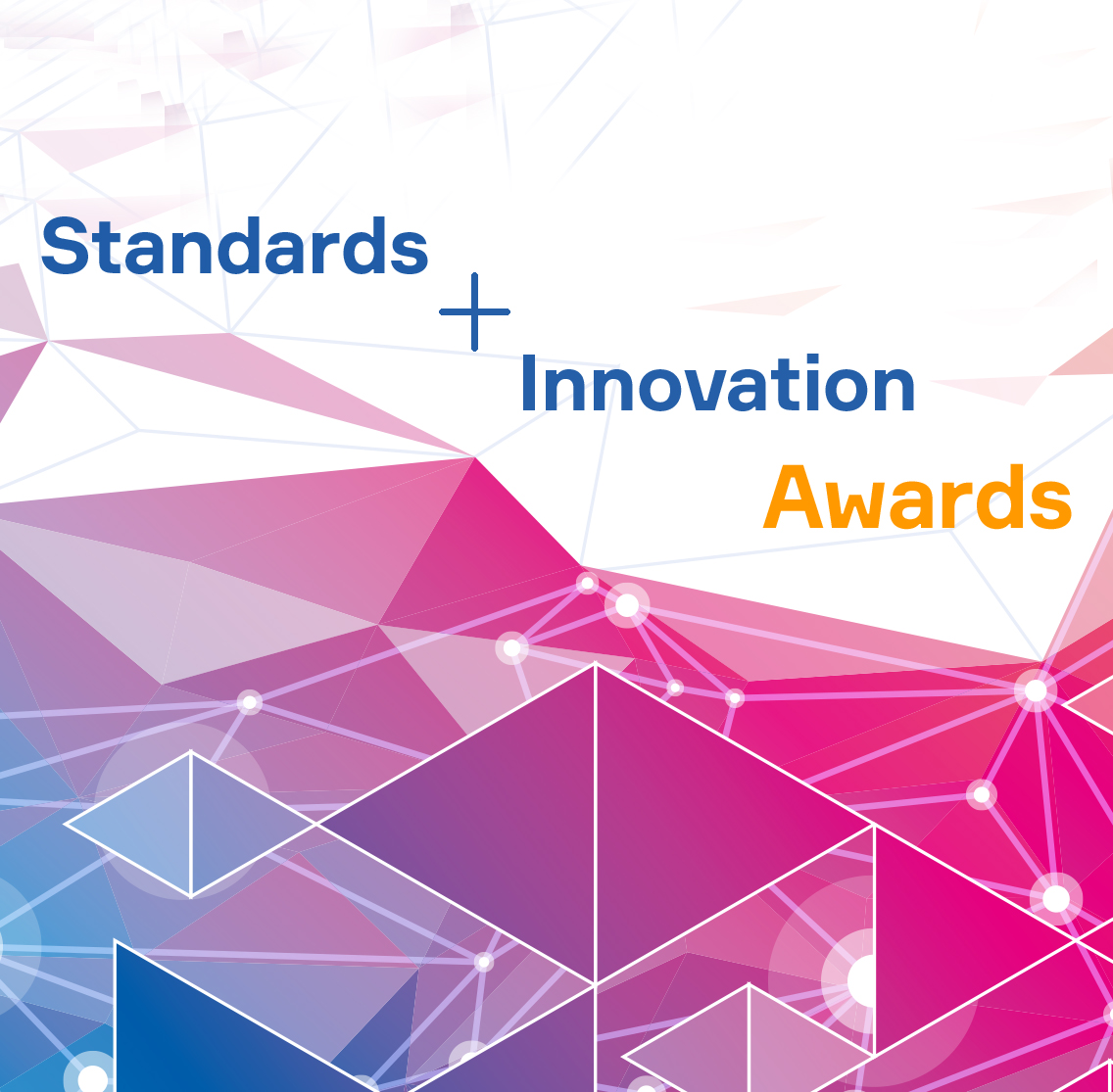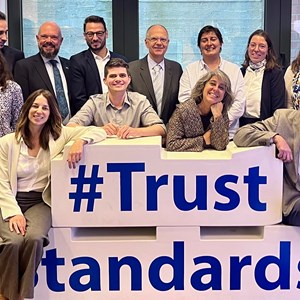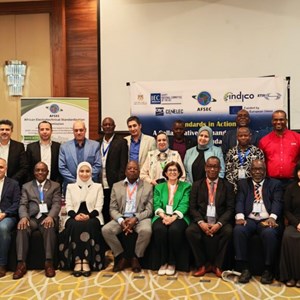On 13 November, CEN and CENELEC revealed the winners of this year’s Standards+Innovation awards at European Commission’s flagship event titled 'From knowledge to impact: Shaping Europe’s next innovation wave'.
For the third year in a row CEN and CENELEC had the honour to present the winners of the Standards+Innovation award at the annual knowledge valorisation event organised by the European Commission’s DG RTD.
The award ceremony was opened by CEN and CENELEC’s Claire Dalier, Account Manager RTD, who was joined by Fernando Urtilla from the Spanish national standardization body, UNE, who was recently appointed as chair of the CEN and CENELEC Advisory Committee on R&I.
In his keynote Fernando Urtilla emphasised the importance of standardization for the continuous consolidation of the internal market and for strengthening Europe’s competitiveness. The efforts of researchers and innovators are important to reach European policy goals, and standardization provides a crucial pathway for these results to the market.
In this spirit, the Standards+Innovation Awards constitute an important way to publicly acknowledge specific contributions that strengthen the link between innovation and standardization.
During the ceremony the nominees that have been put forward by the national members of CEN and CENELEC and carefully evaluated by standardization and innovation professionals based on their link with standardization, their impact and their innovation originality were presented.
The first winner to be revealed was the winner of the Project Award. This category recognises European-wide projects that have actively contributed to standards development. The nominees for this year’s project award were:
- REINCARNATE, nominated by ASI from Austria
- Smart2, nominated by ASRO from Romania
- Dilapro, nominated by NSAI from Ireland
- 20NRM02 MFMET, nominated by IPQ from Portugal
- SapHTies, also nominated by IPQ
- SPRINT, nominated by AFNOR from France
- AURISKI, nominated by SESKO from Finland
- NANOBLOC, nominated by UNE from Spain
- SURPASS, also nominated by UNE
- Circthread, nominated by UNI from Italy
The Project Award went to NANOBLOC who was represented by Cristina Balgna from Politecnico di Torino. NANOBLOC creates innovative antimicrobial, antiviral and antifugal microcoatings to combat the spread of infectious diseases. The project leverages green technologies like Physical Vapor Deposition (PVD) and wet chemistry. An Approach which represents a significant departure from conventional, often chemical-intensive, coating processes. NANOBLOC has promoted the creation of a new CEN workshop titled: Evaluating Antimicrobial Coatings: From air filtration efficiency to antiviral mechanism and ecotoxicology, from which three CEN Workshop Agreements are expected this month.
In the category recognising the contribution of Individual Researchers or Innovators 4 nominations were received:
- Faithri Neff, nominated by NSAI from Ireland, he is a PhD at the Technological University of the Shannon he work is dedicated to enhancing the Acoutic Vehicle Alerting System Standards Through Inclusive Pedestrian Research.
- As a team: Dr. Martin Keller, Liangzhen Wang, and Christoph Frömter, nominated by DIN from Germany, for their joint efforts in implementing a new test method into the EN1568-series regarding the performance of fluorine-free foam agents used for firefighting
- Esteban Abad Holgado, nominated by UNE from Spain, who is a scientist at the Institute of Environmental Assessment and Water Research (IDÆA) of the Spanish National Research Council (CSIC) for decades he has contributed his expertise on dioxins and persistent organics pollutants to standardization contributing to the development of several standards as well as as convenor of the CEN working group on dioxins
- Rembrandt Koppelaar, nominated by UNI from Italy, is a scientist engaged at Ecowise and coordinator of the EU funded project Circthread. He is nominated for his efforts to bridge R&I and standardization in the field of Digital Product Passports.
The award went to Dr. Rembrandt Koppelaar who as part of his work in Circthread served as chairperson of the CEN Workshop Guidelines to create a Digital Product Passport which published in May this year.
This effort has led to the start of another three workshop agreements and supported more than 100 EU-funded projects working on DPP related solutions. His work is helping prepare industry for the upcoming EU legislation on DPPs and fostering more sustainable production and consumption practices in line with SDG 12.
The third award revealed recognizes young researchers for the work done on academic theses, doctoral dissertations or other university research projects addressing standardization. For this award 5 nominations were received:
- Abrar Abdesalam, nominated by NSAI from Ireland, she is a PhD researcher in Mechanical and Manufacturing Engineering at Dublin City University. Among other activities she is contributing to the PolyFast project funded by the Research Ireland-Funded National Challenge Fund dedicated to the removal of PFAS from water her standards-based approach ensure that technologies are market-ready from day one.
- Arttu Virtanen, nominated by SESKO from Finland, he is a student at Metropolia University of Applied Sciences and has with his bachelor thesis provided a guide to streamline the lift installation process at construction sites which can help speed up the installation process.
- Yihan Chan, nominate by DIN from Germany, PhD student at TU Berlin, as a PhD student she is analysing how economic aspects and innovation indicators influence participation in early-stage international standardization
- Luca Nannini, nominated by AFNOR, is a PhD of Universidad de Santiago de Compostella where he as part of a Marie Skłodowska-Curie funded project has investigated the critical intersection of explainable AI, AI ethics and the evolving EU regulatory landscape
The Young Researcher Award went to Luca Nannini in recognition his important contributions in the area of AI. He is currently the Project Leader for CEN/CENELEC JTC 21's JT21008 project, contributing to harmonized standards for the EU AI Act. He also serves as a standardization expert representing Italy in multiple working groups. His career demonstrates a remarkable trajectory from foundational research in AI ethics to impactful leadership in standardization.
The last award to be handed over concerned the newly established education award which recognises efforts to teach and interest students in standardisation. For this award CEN and CENELEC received 4 nominations:
- (FH) Dr. Alfred Radauer, nominated by ASI from Austria, Head of the Institute of Business and Innovation at the IMC University of Applied Sciences, Krems in Austria. As a professor he attempts to make tomorrow’s decision makers fir for the global innovation race by integrating standardization in existing lectures of business students as a means to intervene and shape markets using case studies which also highlight the skills needed for stanardization
- Philippe le Coustumer, nominated by AFNOR from France, is a lecturer and researcher at Université de Bordeaux. Based on his long academic experience and involvement in international standardization he has developed extensive educational material for both bachelor and master students introducing them to standardization
- Dr. Petra Drewer, nominated by DIN from Germany, Professor at University of Applied Sciences in Karlsruhe, is recognised for her ability to present standardization in an engaging and relevant way to the students. She empowers her students and offers them a first-hand experiences by posing them the opportunity to comment on draft standards. A video challenge to her student resulted in a about standardised staircases that went viral with more than 10 mio views.
- Nizar Abdelfkafi, nominated by UNI from Italy, is an associated professor at Politecnico di Milano and a passionate of standardization which he has embedded into courses about supply chain and innovation. He has co-authored the widely used textbook “Understanding ICT Standardization” which is now in its second edition. He has also design a pilot course within Politecnico’s Passion in Action Program, which explicitly links standards with EU values such as inclusivity, democracy and sustainability.
With great honour the price was handed over to Nizar Abdelkafi from Politecnico di Milano. Nizar has reached large cohords of students with his signature pedagogy “teaching by questions” His co-authored textbook and supporting slide deck are used internationally, enabling colleagues to adopt or adapt modules on ICT standardization with minimal barriers. As a member of the EDU4Standards.eu consortium, he is contributing to establishing European Intended Learning Outcomes for education in standardization, thus accelerating cross-institutional uptake and laying the ground for a common recognition of standardization skills.




